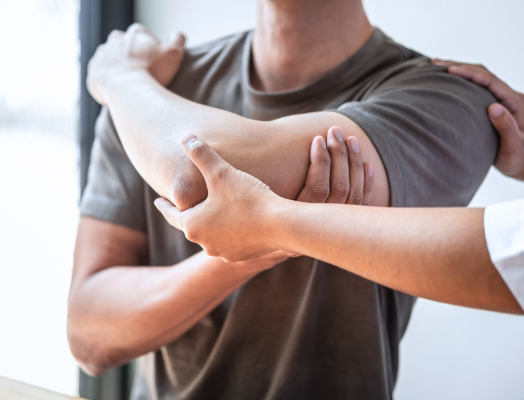When to Visit an Orthopedic Specialist: Symptoms You Shouldn’t Ignore

Muscle and joint pain is one of the most common health complaints today, often brushed off as a temporary issue caused by poor posture or a sedentary lifestyle. However, persistent discomfort or sudden injuries could be signs of underlying orthopedic conditions that require medical attention. Knowing when to consult a specialist is crucial for timely diagnosis and treatment.
In this blog, we’ll explore the key signs and symptoms that indicate it’s time to visit an orthopedic specialist — and why early intervention can help prevent long-term complications.
What Does an Orthopedic Specialist Do?
An orthopedic specialist is a medical professional who diagnoses, treats, and manages disorders of the musculoskeletal system — including bones, joints, muscles, tendons, and ligaments. Whether it’s a sports injury, arthritis, spine issue, or joint degeneration, orthopedic doctors are trained to handle both surgical and non-surgical treatments tailored to your condition.
Common Symptoms That Require Orthopedic Attention
1. Chronic Joint Pain Lasting More Than a Few Weeks
If you’ve been dealing with persistent pain in the knees, hips, shoulders, or any other joint for more than two weeks, it’s time to see a specialist. Chronic joint pain can be a sign of conditions such as:
- Osteoarthritis
- Rheumatoid arthritis
- Bursitis
- Tendonitis
Ignoring the symptoms may lead to further joint damage, reduced mobility, and a decline in quality of life.
2. Limited Range of Motion
Struggling to stretch your arms overhead, bend your knees fully, or rotate your neck? A limited range of motion could indicate joint stiffness due to inflammation, cartilage loss, or joint instability. This often occurs in degenerative diseases like arthritis or after an injury.
Seeking expert help early on can restore your mobility through physical therapy or minimally invasive procedures.
3. Recurrent Bone or Joint Injuries
Frequent sprains, fractures, or dislocations—especially from minor movements—are red flags. This could suggest weakened bones or ligament laxity. You may be dealing with:
- Osteoporosis
- Ligament tears
- Recurrent dislocations due to joint instability
Prompt evaluation by a specialist can help assess bone density, joint strength, and the need for preventive care.
4. Numbness, Tingling, or Weakness in Limbs
These symptoms could be related to nerve compression or spine issues, such as:
- Herniated disc
- Sciatica
- Cervical spondylosis
- Carpal tunnel syndrome
If you experience tingling sensations, weakness in the arms or legs, or difficulty gripping objects, consult an orthopedic specialist without delay. These signs often indicate nerve involvement, which, if untreated, can lead to permanent damage.
5. Visible Deformities or Swelling
Any visible changes to the shape of your bones or joints, such as bow legs, spine curvature (scoliosis), or hand deformities, need a professional evaluation. Swelling that doesn’t reduce with rest and ice could indicate internal damage, infection, or fluid buildup in the joint.
6. Difficulty Walking or Climbing Stairs
Pain while walking, limping, or difficulty climbing stairs could indicate a serious problem with your hip, knee, or ankle joint. Over time, this can impact your balance and risk of falls, especially in elderly individuals.
7. Post-Traumatic Pain or Stiffness
If you’ve recently had an injury — whether due to sports, a fall, or an accident — and continue to experience stiffness or pain long after the injury, it’s time for a thorough evaluation. Lingering pain after trauma may point to:
- Incomplete healing
- Internal tears
- Misalignment
Delaying treatment can lead to chronic pain and long-term disability.
8. Persistent Back or Neck Pain
While occasional back pain is common, persistent or radiating pain could signal deeper problems like spinal disc issues, vertebral fractures, or postural deformities. If the pain spreads to your arms or legs or is accompanied by numbness, seek immediate orthopedic consultation.
Why Early Diagnosis Matters
Delaying treatment of orthopedic problems may worsen your condition over time. What starts as a minor discomfort can develop into chronic pain, disability, or the need for complex surgical intervention. Early diagnosis ensures:
- Faster recovery
- Less invasive treatment
- Reduced risk of long-term complications
- Improved quality of life
How to Choose the Right Specialist
When seeking an orthopedic specialist in Faridabad, consider factors such as:
- Experience in treating specific conditions (sports injuries, joint replacement, pediatric orthopedics, etc.)
- Availability of diagnostic tools (MRI, X-rays, bone density scans)
- Facilities for rehabilitation and physical therapy
- Patient reviews and success rates for procedures
The right specialist will not only diagnose your condition but also design a personalized care plan for recovery and long-term wellness.
Takeaway
Don’t ignore the signals your body is giving you. Persistent pain, reduced mobility, or visible changes in joints should not be taken lightly. Consulting an orthopedic specialist in Faridabad at the right time can make a significant difference in your recovery and prevent serious complications down the line.
Whether you’re an athlete, a working professional, or a senior citizen, taking proactive steps toward orthopedic health is essential. If any of the symptoms above sound familiar, don’t wait — schedule a consultation and take the first step toward a pain-free life.


